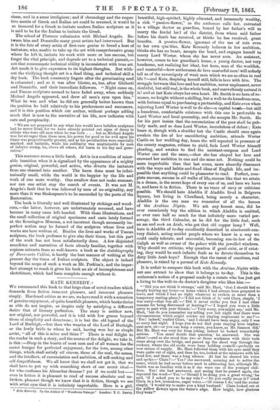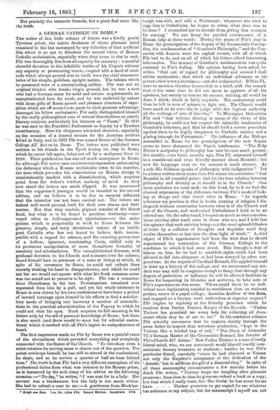KATE KENNEDY.*
WE recommend this book to that large class of novel-readers which demands from fiction innocent pleasure, and innocent pleasure simply. Hardened critics as we are, we have read it with a sensation of genuine enjoyment, of quite heartfelt pleasure, which books thrice as able do not inspire, or inspire only by satisfying a different desire that of literary perfection. The story is neither new, nor original, nor powerful, and it is told with few graces beyond those of simplicity and directness ; it is but the old legend of the Lord of Burleigh,—but then who wearies of the Lord of Burleigh, or the lowly bride to whom he said, having won her as simple artist, " all of this is mine and thine ?" There is real delight to the reader in such a story, and the source of the delight, we take it, is this :—Deep in the hearts of most men and of all women lies the secret hunger for perfected enjoyment, for the love, among other things, which shall satisfy all craves, those of the soul, the senses, and the intellect, of renunciation and ambition, of self-seeking and self-forgetfulness. We all know that we shall not get it, that we shall have to put up with something short of our secret ideal— for who confesses his Alnaschar dreams ? yet if .we could buteven in fiction it is pleasant to read of success absolute and un-
broken, pleasant though we know that it is fiction, though we see with artist eyes that it is infinitely improbable. Here is a girl,
• Kate Earned,. By the Author of " Wondrous Strange." London: T. C. Newby. beautiful, high-spirited, highly educated, and immensely wealthy, a rich " passion-flower," as the authoress calls her, entrusted to a village doctor as guardian, bound by her father's will to marry the feudal lor3 of the district, from whom said father before his death has received, or thinks he has received, great benefits. A passion-flower, ignorant of the use of rain even to her own qualities, Kate Kennedy believes in her ambition, thinks she has no heart, accepts the bond, and engages herself to marry Lord Werter, whom she has never seen. An assistant, however, comes to her guardian's house, a young doctor, not very handsome, not realizing her ideal, but keen, man of the worldish, and masterful—how authoresses do love masterful men! will nobody tell us of the sovereignty of weak men which we see so often in real life ?—and Kate, despising herself still, falls in love with him. The struggle between this love and her ambition, never unpleasant, never doubtful, but still real, is the whole book, and marvellously natural it is! and at last Kate obeys her own heart. Mr. Smith is no hero of ro- mance, no knight without a shilling, but a well-to-do humdrum man, with fortune equal to purchasing a partnership, and Kate even when rejecting Lord Werter is well to do also—a capital touch—but still a humdrum, comfortable existence with this one is preferable to Lord Werter and local queenship, and she accepts Mr. Smith. He for his part insists that the renunciation of the peer shall be pub- licly made, and so does Lord Werter, incredulous of defeat ; Kate bears it, though with a shudder lest the Castle should once again awaken the fire of her smouldering ambition, attends Werter Castle on her wedding day, hears the will repeated in presence of the county magnates, refuses to yield, feels Lord Werter himself pleading, and awakes to find the assistant-surgeon and Lord Werter one and the same,—that she has obeyed her love and crowned her ambition in one and the same act. Nothing could be more improbable than that last scene, more absurdly dissonant with the ways and habits and fixed ideas of English life, and im- possible that anything could be pleasanter to read. Perfect, com- plete success, success in all walks of life, success like that we attain in a dream, is the secret hope of every one of us, and here we have it, and have it in fiction. There is no trace of envy or criticism possible. We should hate Aladdin if Aladdin lived in Belgrave Square, but living in Cloudland, being merely a character, Aladdin is the one man we remember of all the heroes of the Arabian Nights. We ask any honest man, did he ever consciously buy the edition in which Aladdin is omitted, or ever care half so much for that infinitely more varied per- sonage, the third Calendar, as he did for the little fool, such an ass and such an Arab, who got that old copper lamp ? Well, here is Aladdin of to-day excellently described in nineteenth-cen- tury dialect, acting amidst people whom we know in a way we could easily tolerate, and successful, becoming son-in-law of the Caliph as well as owner of the palace with the jewelled windows. Why should we criticize, why question if genii exist, or if exist- ing, they would be such infinite fools as to devote themselves to dirty little Arab boys? Enough that the rarest of emotions, real pleasure, is raised by a perusal of Kate Kennedy.
It is unfair to compare this book with the Arabian Nights with- out one extract to show that it belongs to to-day. This is the authoress's notion of a proposal made by a curate who has just got a living to the well-to-do doctor's daughter who likes him :— " Did you not think it strange,' said Mr. Hart, 'that I should feel so deeply leaving my home—a home which I had always been prepared to leave, and which I had no right whatever to reckon as more than a temporary resting-place.?—'I did not think of it,' said Clara, simply, I
was sorry—that was Did it never strike you that I had other reasons for being distressed at leaving?'—' I hoped you were a little sorry to part with your friends.'—' Very sorry, you might say,' said Mr. Hart, but do you remember my telling you last night that there were circumstances which might render my staying unpleasant to me ?'— ' Yes ! indeed,' replied Clara, and I should have been angry, only I was so sorry last night. I hope you do not find your staying here unplea- sant now, sir—or you can keep a curate, you know, as Mr. Samson did.' But Mr. Hart was very far from joking, indeed he looked remarkably
serious. You must decide that question,' he answered. She was silent !—and as she stood thus two or three workmen with their tools came along over the bridge, and passed up the short way through the rookery, where the old rooks were busy holding council—probably on new means of supply. Mr. Hart followed them with his oyes until they were quite out of sight, and then he, too, looked at the minnows with his head low, and there was a long silence. At last he cleared his voice and spoke—' Clara!'—' Yes !' she answered, seeming not to notice the name, which he had never before used in addressing her, although Mr. Smith was as familiar with it as if she were one of the younger chil- dren. Yes ! she had answered, and seeing that he paused again, she repeated the word—' Yes.'—' Should I be doing you a great wrong,' he said, `if I asked you to be my wife r-. Do you really mean it? cried Clara, in a low, tremulous, eager voice.—' Of course I do,' said the rector simply, 'I would try to make you a kind husband.' Clara looked out at the yellow Sowers upon the water's edge. How bright, how glorious they were!"
Not precisely the romantic formula, but a great deal more like the truth.































 Previous page
Previous page